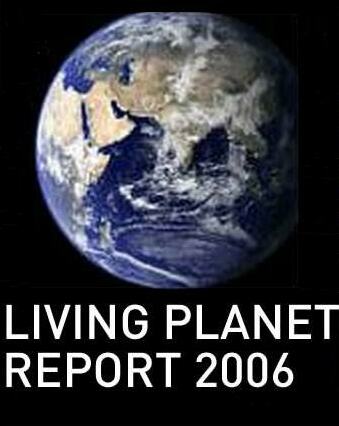
Publisher:
Bonnie King
CONTACT:
Newsroom@Salem-news.com
Advertising:
Adsales@Salem-news.com

~Truth~
~Justice~
~Peace~
TJP
Oct-24-2006 13:03

 TweetFollow @OregonNews
TweetFollow @OregonNews
Report: Human Population Has Become Too Big For Nature
Salem-News.comThe World Wildlife Fund’s 2006 Living Planet Report, the group’s biennial statement on the state of the natural world, says that on current projections humanity will be using two planets’ worth of natural resources by 2050 -- if those resources have not run out by then. It also confirms the trend of biodiversity loss seen in previous Living Planet reports.
 Image courtesy: panda.org |
(BEIJING, China) - The world’s natural ecosystems are being degraded at a rate. unprecedented in human history, according to a report released Tuesday by WWF, the global conservation organization.
Already resources are depleting, with the report showing that vertebrate species populations have declined by about one-third in the 33 years from 1970 to 2003. At the same time, humanity’s Ecological Footprint -- the demand people place upon the natural world -- has increased to the point where the Earth is unable to keep up in the struggle to regenerate.
"We are in serious ecological overshoot, consuming resources faster than the Earth can replace them," WWF International’s Director General James Leape said. “The consequences of this are predictable and dire."
"It is time to make some vital choices," he added. "Change that improves living standards while reducing our impact on the natural world will not be easy. The cities, power plants and homes we build today will either lock society into damaging over-consumption beyond our lifetimes, or begin to propel this and future generations towards sustainable living.”
The Living Planet Report, launched in Beijing, China, pulls together various data to compile two indicators of the Earth’s well-being.
The first, the Living Planet Index, measures biodiversity, based on trends in more than 3,600 populations of 1,300 vertebrate species around the world. In all, data for 695 terrestrial, 344 freshwater and 274 marine species were analyzed. Terrestrial species declined by 31 per cent, freshwater species by 28 per cent, and marine species by 27 per cent.
The second index, the Ecological Footprint, measures humanity’s demand on the biosphere. Humanity’s footprint has more than tripled between 1961 and 2003. This report shows that our footprint exceeded biocapacity by 25 per cent in 2003. In the previous report (based on data to 2001), this figure was 21 per cent. The carbon dioxide footprint, from the use of fossil fuels, was the fastest growing component of our global footprint, increasing more than ninefold from 1961 to 2003.
Countries of over a million people with the largest footprint, in global hectares per person, are the United Arab Emirates, the United States of America, Finland, Canada, Kuwait, Australia, Estonia, Sweden, New Zealand and Norway. China comes mid-way in world rankings, at number 69, but its growing economy and rapid development mean it has a key role in keeping the world on the path to sustainability.
To view the report visit panda.org
Articles for October 23, 2006 | Articles for October 24, 2006 | Articles for October 25, 2006





Quick Links
DINING
Willamette UniversityGoudy Commons Cafe
Dine on the Queen
Willamette Queen Sternwheeler
MUST SEE SALEM
Oregon Capitol ToursCapitol History Gateway
Willamette River Ride
Willamette Queen Sternwheeler
Historic Home Tours:
Deepwood Museum
The Bush House
Gaiety Hollow Garden
AUCTIONS - APPRAISALS
Auction Masters & AppraisalsCONSTRUCTION SERVICES
Roofing and ContractingSheridan, Ore.
ONLINE SHOPPING
Special Occasion DressesAdvertise with Salem-News
Contact:AdSales@Salem-News.com
Terms of Service | Privacy Policy
All comments and messages are approved by people and self promotional links or unacceptable comments are denied.
Albert Marnell October 26, 2006 9:55 pm (Pacific time)
From someone who's family has had their share of skin cancer from the sun, something must be wrong. I remember my grandmother (born 1900) said to me that she thought there was something wrong with the sun (around 1985). She thought it was different from when she was young and too strong. After living almost 91 years she was probably noticing a real change and never heard the term global warming.
Anonymous October 26, 2006 12:19 pm (Pacific time)
Aren't we supposed to be dead from the hole in the ozone by now. Or was that the melting of the polar ice caps? No, I know! It was the asteriod that was going to take us out. Just another doom and gloom study. Yawn.
Albert Marnell October 24, 2006 8:44 pm (Pacific time)
When the population outgrows the food supply people die. Some people will always have extra, extra food while others are told there is none. What a wonderful world?
[Return to Top]©2025 Salem-News.com. All opinions expressed in this article are those of the author and do not necessarily reflect those of Salem-News.com.